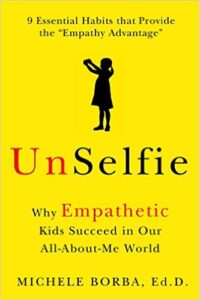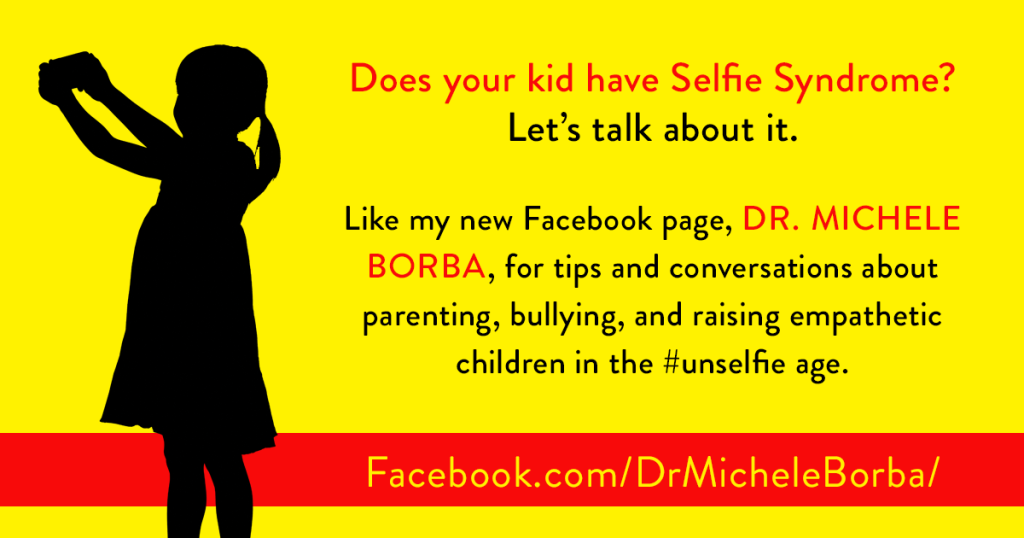Okay. You admit you have a materialistic little critter on your hands. Take comfort. There are proven ways to deprogram a materialistic kid. It will take time and commitment, but the benefits are profound for your child and your family. Kids who are less materialistic are more “we” oriented, than “me.” They are more concerned about others, and less worried about how they look and what they own. Their self-esteem is more authentic. But perhaps most important, research clearly shows that these children are more empathetic, caring, collaborate, compassionate and morally courageous.
Here are a few of the best parenting solutions from my latest book, UnSelfie: Why Empathetic Kids Succeed in Our All-About Me World (June 2016, Simon and Schuster) to help you succeed:
1. Watch those TV commercials!
Research shows that the fewer commercials kids see, the less materialistic they become. When kids’ TV viewing was cut by one-third; they were 70 percent less likely than their peers to ask parents for a toy the previous week.
Solution: Hit the mute button on your television remote and talk whenever those commercials are on. Turn your child toward more commercial-free television shows or even TVO his “have-to-see” favorite so he can cut out the commercials all together.
2. Spend more time than money on your kids
Materialistic kids go on far more shopping outings with their parents. So be honest: How many outings stress non-material values?
Make a conscious effort to spend time together doing things that don’t cost a dime: Go to the park and the museum, talk, take bike rides, build forts, bake cookies, watch the clouds, and play Monopoly. Show your kid the “other” side of life.
3. Rotate “stuff”
Instead of letting your child view his stockpile of matchbox cars, action figures, CDs or whatever, store some away in a closet for a week or month.
Your new rule is when stowed, items are returned, while new ones are stored in their place.
The simple solution of rotating stuff makes bedroom cleanups easier, and helps kids learn they don’t need so much to have a good time. Best yet, the returned items are more appreciated and treated like new.
My girlfriend was master at this. She figured out quite early that her kids didn’t need all those toys and so she would simply “store” items her kids didn’t play with as often in a closet. Then a month later she’d rotate the toys – taking out the stored items and putting away toys that weren’t so popular for a later day. Most amazing – her kids were elated to find the “new” toys!
Try it!
4. Curb those $$$$$ rewards
“I’ll do it if you’ll buy me those jeans.” “How much will you give me?” “But I wanted the X-Box!”
If you’ve heard those words from your kid chances are he’s been reward with monetary prizes and material possessions for behaving, working or just plain breathing. And materialistic kids keep upping the ante want more. From this moment on your new response is to just expect your child to do the job or behave without compensation.
Instead put away your wallet, and give praise, hugs and pats on the back whenever they are earned.
5. Stop hoarding
Materialistic kids tend to be pack rats and the more stuff the better. So take a Reality Check. Might your child be the next poster kid for the reality show, “Hoarders?” If so, it’s time for serious action.
To break your child’s hoarding habit provide three boxes labeled with one of these words: “Trash” (for ripped, torn, or broken items; “Memories,” (items with special meaning); and “Charity” (gently used toys, accessories or clothing that other kids may appreciate). Then encourage him to go through his drawers, closets, and shelves.
Explain that he should keep what he really needs, uses and wears, and put the rest into the specified box. Make sure that he helps you take the “Charity” box to an organization such as Goodwill or Red Cross to help him realize that not everyone is so fortunate.
6. Teach “Needs” vs. “Wants”
Materialistic kids often want things “N.O.W.” and don’t stop to consider if the item is even necessary.
Solution: Whenever your kid pleads for some nonessential thing he just “must have” ask: “Is it something you really need or just want?” Consistency is crucial…don’t back down!
Then outlaw nonessential, “have to have it” NOW spending.
7. Teach the habit of “giving” not “getting”
“Hands on” giving helps counter materialism more powerfully than almost anything else. So take your kids with you to bring dinner to a sick neighbor or to volunteer in a soup kitchen together.
Require your kids give part of a weekly allowance to needy kids. To stretch empathy, have your child shut his eyes and visualize the recipients’ reactions to the child’s gift.
Choose a cause as a family: adopting an orphan through Save the Children; befriending the lonely neighbor. Let your kid feel the power of giving.
8. Model restraint
Research shows that parents who are materialistic raise the most materialistic kids. You’re the best role model for helping your child cope with our complicated material world, so what kind of example are you setting for your kid?
Or just use the simplest parenting solution: the next time your kid says “I want….” say, “Honey, I want to boost your self-esteem and decrease your chance for depression, so NO!”
On this note, research is clear: money does not buy happiness. In fact, the wealthier are exactly less happier. Don’t think you’re doing your child any favor by buying to think it will create a more content critter. Instead, help your child learn constraint and to monitor “impulsiveness” by not spending ASAP. And focus your efforts on boosting your child’s “inside” qualities. Who she is on the inside, matters far more for self-esteem and happiness than the brand she wears.
For more solutions, signs of materialism, the latest research on how to curb it, or dozens more practical and proven parenting tips on 101 hot-button topics see The Big Book of Parenting Solutions: 101 Answers to Your Everyday Challenges and Wildest Worries
Meanwhile, what are you doing to help raise a less materialistic kid in a materialistic world? If you have ideas you’d like to pass on, please post your best tip! I’d love to hear from you.
Dr. Michele Borba, Parenting Expert
 My new book, UNSELFIE: Why Empathetic Kids Succeed in Our All-About-Me World is in print June 2016. (Yahoo!) I’ve spent the last five years researching and writing this book as well as literally flying around the world to find the best ways we can activate our children’s hearts. My goal is to create a conversation that makes us rethink or view of success as exclusively grades, rank and score and includes traits of humanity! It’s filled with common-sense solutions based on the latest science to help us raise compassionate, caring, courageous kids. It’s time to include “empathy” in our parenting and teaching!
My new book, UNSELFIE: Why Empathetic Kids Succeed in Our All-About-Me World is in print June 2016. (Yahoo!) I’ve spent the last five years researching and writing this book as well as literally flying around the world to find the best ways we can activate our children’s hearts. My goal is to create a conversation that makes us rethink or view of success as exclusively grades, rank and score and includes traits of humanity! It’s filled with common-sense solutions based on the latest science to help us raise compassionate, caring, courageous kids. It’s time to include “empathy” in our parenting and teaching!
You can also refer to my daily blog, Dr. Borba’s Reality Check for late-breaking news and research about child development.
Follow me on twitter @MicheleBorba


